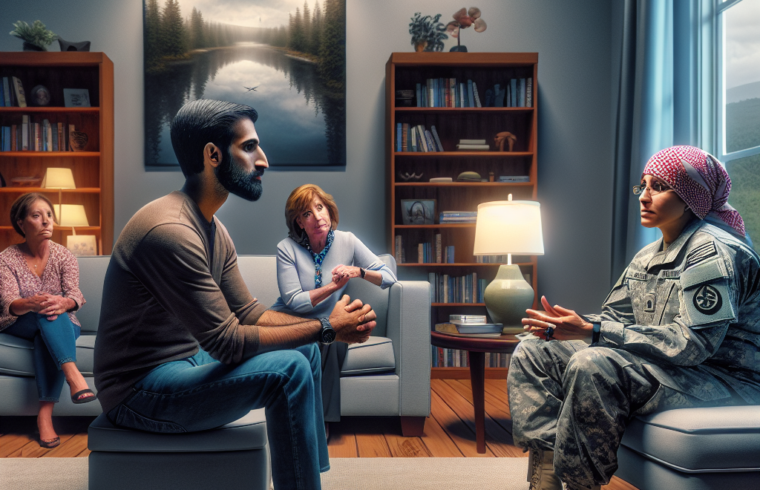==> Thank you for reading this post! Click Here If you are looking for support and Victory over PTSD.
Understanding PTSD and Its Impact on Families
What is PTSD?
Let’s be honest. Post-Traumatic Stress Disorder (PTSD) isn’t just a fancy term you hear in movies. It’s a serious condition that many veterans face after returning from duty. It’s a response to trauma that can completely shift how you view the world. For me, it started with nightmares and the constant feeling of being on edge. Not fun, to say the least.
PTSD can manifest in various ways—flashbacks, severe anxiety, and even changes in mood. Think about your loved ones: how would their lives change if they didn’t understand what you were going through? It’s crucial to grasp the full scope of PTSD, not just for you but for those around you. Knowing the signs can help family members be more empathetic.
Understanding PTSD is the first step towards healing, for both the veteran and the family. It’s like peeling back layers of an onion—there’s depth to it, and while it may bring tears, you’ll find resilience at the core.
The Role of Family in the Healing Process
Support Systems Matter
When I was dealing with my own PTSD, I realized how vital my family was in my healing journey. It wasn’t just the therapy sessions that helped; it was the late-night talks with my spouse or the quiet time spent with my kids. Having a strong support system is a game changer!
Family members can serve as a buffer against feelings of isolation. The more you communicate, the better your chances of understanding one another. Sometimes all it takes is a simple conversation about what you’re facing—voicing those deep-seated feelings can lighten the load considerably.
It’s easy to feel alone in this battle, but as they say, “It takes a village.” Getting everyone involved can turn the healing process into a united journey instead of a lonely road.
Navigating Family Counseling Options
Choosing the Right Therapist
Navigating through family counseling can feel overwhelming, especially when PTSD is on the table. I remember feeling lost when searching for a therapist who “got” our situation. The right therapist can make all the difference, so I can’t stress this enough: do your homework!
Look for professionals who specialize in trauma and have experience working with veterans and their families. Getting referrals from fellow veterans or agencies can lead you to someone who truly understands your needs. Don’t hesitate to ask about their approach and methods before making a commitment.
Trust me, finding a therapist that clicks with your family dynamic can eliminate a ton of stress and make the road to healing much smoother.
Effectively Communicating During Counseling
Opening Up to Each Other
One of the biggest challenges I faced during counseling was simply speaking up. Letting vulnerability shine through can feel like stepping off a precipice. But here’s the thing—when everyone opens their hearts, the healing can really begin. This takes practice, and it’s definitely not easy!
Get Support and Help with Recovery! Visit us for more Information and Support
During sessions, I found that setting some ground rules helped everyone feel more comfortable. For example, using “I” statements can help express feelings without sounding accusatory. Trust me, you don’t want to create a defensive atmosphere—it’s all about collaboration.
The journey of communication is not about sharing every detail but about conveying your feelings. It’s about creating an atmosphere where everyone feels heard and understood, transforming silence into words that heal.
Steps to Maintaining Progress After Counseling
Practicing Self-Care Together
Let’s talk about self-care. I know, I know—everyone says it, but it’s crucial! After counseling, my family and I made it a point to engage in activities that we all enjoyed together. Whether it was going on weekend hikes or cooking a meal as a team, spending quality time helped reinforce those counseling lessons.
As you move forward, build rituals that promote togetherness. It could be movie nights or game days—whatever works for you. Keeping those connections strong is essential for maintaining progress.
Lastly, don’t forget to check in with each other regularly. It’s easy to slip back into old habits if you’re not diligent about staying connected. So, keep those lines of communication open, and encourage each other on this healing journey!
Frequently Asked Questions
1. What is PTSD, and how does it affect veterans?
PTSD is a mental health condition triggered by experiencing a traumatic event. For veterans, this could stem from combat, accidents, or witnessing acts of violence. It can lead to severe anxiety, mood swings, and flashbacks, significantly impacting daily life.
2. Why is family involvement important in PTSD counseling?
Family involvement is crucial because PTSD doesn’t just affect the veteran; it impacts the entire family dynamic. When family members are educated and involved, it creates a supportive environment conducive to healing.
3. How do I find a therapist for family counseling?
Look for therapists specializing in trauma and veteran issues. Ask for recommendations from fellow veterans, check online resources, or consult local veterans’ services for referrals.
4. Can self-care really help after counseling?
Absolutely! Engaging in self-care activities with family members fosters connections and keeps the communication flowing. It reinforces the progress made in therapy and creates lasting memories.
5. What are some effective communication techniques during counseling?
Using “I” statements, active listening, and setting ground rules can create a safe space for sharing thoughts and feelings. These techniques help avoid misunderstandings and promote healthy dialogue.













